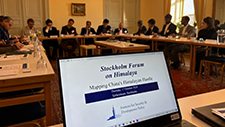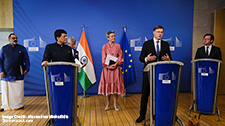IN DEFENSE OF THE LIBERAL INTERNATIONAL ORDER

Norah M. Huang, Jagannath Panda, I-Chung Lai, Pao-Wen Li, Cheng-Yi Lin, Liang-Chih Evans Chen, Nobuyuki Hiraizumi, Nobukatsu Kanehara, Shin Kawashima, Jun Nagashima, Tatsuo Shikata, Niklas Swanström, Lars Vargö, Zsuzsa Anna Ferenczy, Alexander Radzyner, Brendon J. Cannon, Filippo Fasulo, Gedaliah Afterman, Jan Hornat, Joe Varner, Lai Thai Binh, Malcolm Davis, Mrittika Guha Sarkar and Stephen R. Nagy
In recent years, the geopolitical fight for global economic, diplomatic, and institutional control has acutely intensified, accentuating the crisis in the existing post-World War II Liberal International Order (LIO), championed for long by the United States. The primary grounds for the increase in tensions include China’s relentless reach for superpower status, the Russia-China anti-West convergence, North Korea’s growing nuclear provocations, the U.S.’ reorientation toward its allies and partners, and the rising fortunes of the middle powers. Moreover, the disruptive authoritarian regimes including Iran, Myanmar, North Korea, and Russia led by China and their growing intent to coalesce against the LIO are feeding its decline.
As a result, the democratic world at large is now increasingly recognizing the need to cautiously stem this growth in authoritarianism, particularly China’s attempts to alter the status
quo. Concurrently, even as the world had not come to grips with the ramifications of the COVID-19 pandemic, including in supply chains, the global economic slowdown together with China’s stalling economic recovery and high inflation, has been severely impacted by the protracted Ukraine war. The latest Hamas-Israel war in West Asia will further “fragment” the global economy and, in turn, the geopolitical, order; unfortunately, the lack of international cooperation has been a hallmark of the new brewing Cold War era.
Of late, the centrality of the developing and emerging world, the so-called Global South is an added dimension that has now been thrust into the spotlight. The liberal order’s engagement with the developing world is especially important given China’s constant outreach and appeal to the Global South as a leader against Western (U.S.) dominance that is ready to reshape the global order to better suit common (non-Western) interests. Further, the failure of multilateralism, including the United Nations (UN) system, in stemming traditional and non-traditional security challenges and threats around the world has added fuel to the fire. Against such a dismal scenario, can the democratic world coalesce in defense of the LIO? What is the role of the Indo-Pacific in this quest? Would building a global coalition in favor of Taiwan be seen as a test-case scenario for the LIO? Could enhanced cooperation including in connectivity, infrastructure development, and supply chains be, at least, part of the answer?
This book—a part of a joint research project by The Prospect Foundation (PF), the Institute for Security and Development Policy (ISDP), and the Kajima Institute of International Peace (KIIP)—is an attempt to provide fresh perspectives on the theme “Future of International Order based on Liberalism.” It analyzes the evolving political realities and aims to plug the gaps in current governance models, with special reference to three key areas: (1) A strategic shield vis-à-vis the Taiwan contingency; (2) a new geopolitical equilibrium in the Indo-Pacific; and (3) a new partnership with the Global South. Going forward, it also provides notable policy recommendations.




